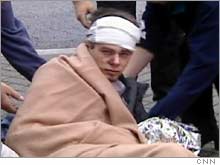 |
| One of the injured after the rush hour blasts that rocked London Thursday. |
|
| Plus: The economic outlook
|
|
|
|
|
|
|
NEW YORK (CNN/Money) -
The U.S. stock market took a measured approach to the apparent terrorist attacks in London Thursday -- with the Dow, Nasdaq and S&P ending the trading day slightly higher after falling just under 1 percent in the morning.
Long-term investors have good reason to keep cool heads as well.
"If you have a long-term perspective, you don't react to every piece of news," said certified financial planner Mari Adam.
Indeed, when her clients get nervous about a steep drop in the market after bad news, Adam reminds them they're better off waiting until the price on an investment reaches their sell target -- the price at which they had planned to sell -- rather than unloading the asset when prices are falling.
That's "like catching a falling knife," she said.
Unless you absolutely need cash today, her recommendation is to sit tight and see how events unfold, since so little concrete information is available about the attacks and reactions to them by governments around the world.
"Just let it play out a little," Adam said, noting that when the market reacts strongly to an event, it tends to overreact both on the upside and the downside.
And if history is any guide, she said, the Sept. 11 attacks in the United States were hardly the biggest factor in the stock market's many downturns since then.
Practically speaking, she noted, the attacks weren't against a productive resource such as an oil refinery, which would have had a more tangible effect on the flow of oil and, hence, investments.
For retirees drawing income from dividend-paying stocks and bonds, Adam doesn't anticipate that they will be much affected. If anything, bonds are likely to react positively. "When there's bad news, what do people like? Bonds," she said.
Just after 4 p.m., Treasury prices were still higher, leaving the yield on the 10-year note at 4.05 percent, down from 4.07 percent late Wednesday, but well off its morning low of about 3.94 percent.
The yield had fallen that low as traders bought Treasuries in a knee-jerk flight to safety after the attacks. Treasury prices and yields move in opposite directions.
If any stocks are going to get knocked about in reaction to news of the London attacks, it may be those companies with heavy bets in Western Europe, Adam predicted.
But, she added, the vulnerability of the region to attacks would be just one on a list of concerns about the region, which hasn't exhibited the kind of robust economic growth investors had been expecting and has seen a weakening of the euro against the dollar.
For a broader look at why the impact of the London attacks on the markets may be short-lived, click on Terror fallout: Emotion vs. calculation.

|